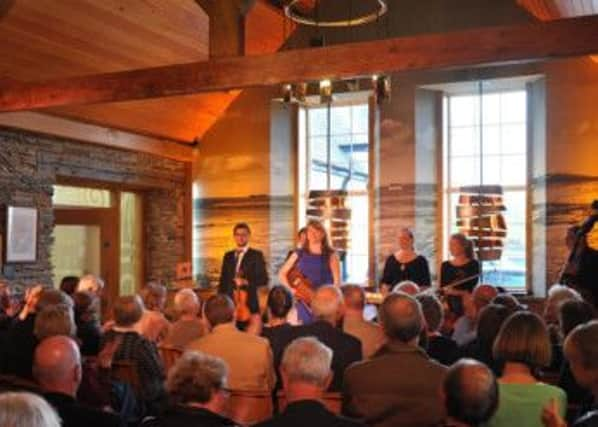Festival review: St Magnus International Festival


St Magnus International Festival - various venues, Orkney
*****
But the big windows at the Orkney Brewery in far-flung Quoyloo, where on Monday a quartet from the Trondheim Soloists gave the group’s third St Magnus Festival concert, offered a view on Orkney’s landscape and birdlife that threatened to distract from the music being performed – not that there was much chance of distraction with the Trondheim players’ exceptionally vivid, sometimes pleasingly raw account of Grieg’s First String Quartet.
The foursome played as if every phrase had a personal meaning, with a fine control of balance, shape and flow that the intimate space made all the more evident. They were later joined by the hugely charismatic Emilia Amper on nyckelharpa – an ungainly-looking but evocative Swedish keyed fiddle – for folk music old and new, again expertly balancing the fiddle’s reedy coldness (and its gentle clatter of wooden keys) with the warm richness from the Trondheim players. It was powerful, passionate and just exquisite – and a fine example of the St Magnus Festival’s effortless boundary-pushing at its best.
Advertisement
Hide AdThere was more contrasting heat and chilliness back in Kirkwall’s St Magnus Cathedral on Tuesday lunchtime, when the Dublin-based Fidelio Trio brought together the hot-blooded passions of Korngold’s op.1 Piano Trio – written, remarkably, when the composer was just 13 – with the cool gravity of Shostakovich’s Seven Romances on Verses by Alexander Blok, sung with extraordinary intensity by soprano Joan Rodgers.
The threesome went for Korngold’s late-Romantic excesses with abandon – Mary Dullea’s rather clangorous piano part (sent reverberating around St Magnus’s resonant acoustic) in fact seemed entirely appropriate for the sometimes overblown music. But they reeled things in for a tightly controlled account of the dark Shostakovich songs, which seemed to bristle with barely suppressed fury.
Emotions ran high, too, later that evening, when Danish conductor Thomas Dausgaard drew some searing playing from the BBC Scottish Symphony Orchestra in the Pickaquoy Centre Arena. It’s a sports hall the rest of the year, and its acoustic, although good, favours brass and percussion over strings – but Dausgaard made great play of that slight imbalance in an enormously powerful Tchaikovsky “Pathétique” Symphony that seemed to scream of its own anguish. There was something elemental about the way he drew skeins of melody from the orchestra with his broad gestures, yet he managed to make the second movement’s off-kilter waltz light and breezy, and the scherzo’s ironically triumphant march blazed with energy. It was as if he was bringing the music freshly to life, taking nothing as read, and the orchestra responded with passionate conviction.
Beforehand, Nicholas Daniel gave a commanding account of Richard Strauss’s demanding Oboe Concerto, moving on to a brief 80th birthday tribute to festival founder Peter Maxwell Davies as an encore. In Daniel’s movingly expressive playing, there was something elemental, too, about Maxwell Davies’s concise First Grace of Light, which seemed to become a vivid response to the keening birdsong and Orcadian landscape just outside the concert hall.
Seen on 22-26.06.14